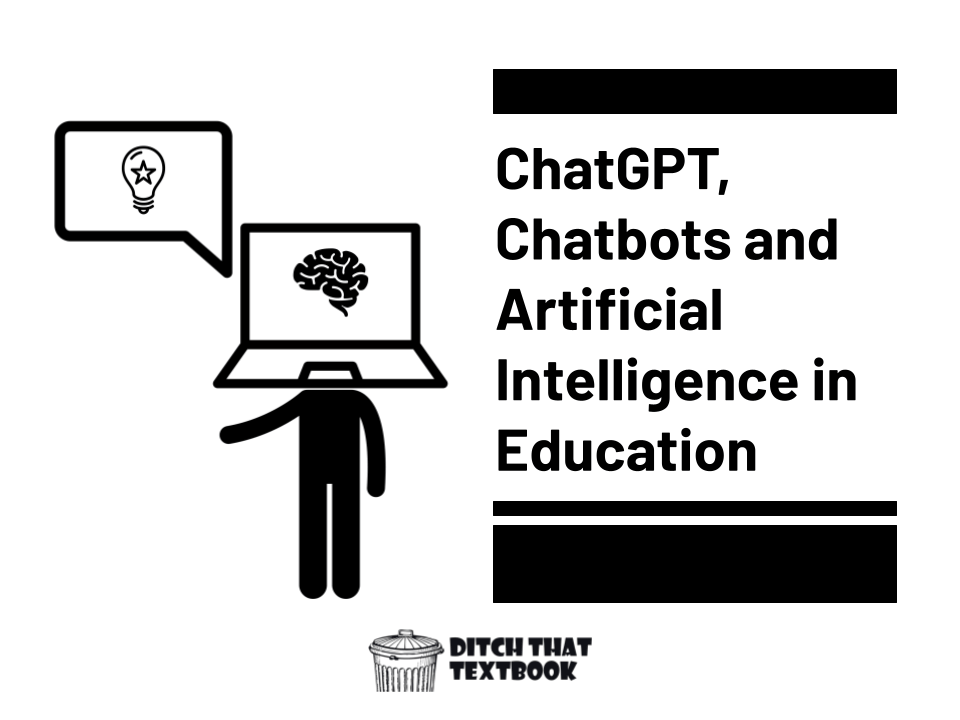ChatGPT, Chatbots and Artificial Intelligence in Education — from ditchthattextbook.com by Matt Miller
AI just stormed into the classroom with the emergence of ChatGPT. How do we teach now that it exists? How can we use it? Here are some ideas.
Excerpt:
Now, we’re wondering …
- What is ChatGPT? And, more broadly, what are chatbots and AI?
- How is this going to impact education?
- How can I teach tomorrow knowing that this exists?
- Can I use this as a tool for teaching and learning?
- Should we block it through the school internet filter — or try to ban it?
Also relevant/see:
We gave ChatGPT a college-level microbiology quiz. It blew the quiz away. — from bigthink.com by Dr. Alex Berezow
ChatGPT’s capabilities are astonishing.
Key takeaways:
- The tech world is abuzz over ChatGPT, a chat bot that is said to be the most advanced ever made.
- It can create poems, songs, and even computer code. It convincingly constructed a passage of text on how to remove a peanut butter sandwich from a VCR, in the voice of the King James Bible.
- As a PhD microbiologist, I devised a 10-question quiz that would be appropriate as a final exam for college-level microbiology students. ChatGPT blew it away.
ChatGPT Is Dumber Than You Think — from theatlantic.com by Ian Bogost
Treat it like a toy, not a tool.
Excerpt:
On the one hand, yes, ChatGPT is capable of producing prose that looks convincing. But on the other hand, what it means to be convincing depends on context. The kind of prose you might find engaging and even startling in the context of a generative encounter with an AI suddenly seems just terrible in the context of a professional essay published in a magazine such as The Atlantic. And, as Warner’s comments clarify, the writing you might find persuasive as a teacher (or marketing manager or lawyer or journalist or whatever else) might have been so by virtue of position rather than meaning: The essay was extant and competent; the report was in your inbox on time; the newspaper article communicated apparent facts that you were able to accept or reject.
I Would Have Cheated in College Using ChatGPT — from eliterate.us by Michael Feldstein
Excerpt:
These lines of demarcation—the lines between when a tool can do all of a job, some of it, or none of it—are both constantly moving and critical to watch. Because they define knowledge work and point to the future of work. We need to be teaching people how to do the kinds of knowledge work that computers can’t do well and are not likely to be able to do well in the near future. Much has been written about the economic implications to the AI revolution, some of which are problematic for the employment market. But we can put too much emphasis on that part. Learning about artificial intelligence can be a means for exploring, appreciating, and refining natural intelligence. These tools are fun. I learn from using them. Those two statements are connected.
Google to Rival OpenAI’s ChatGPT? New AI Bot for Chats in 2023, CEO Claims to Use it for Search — from techtimes.com by Isaiah Richard
Google to expand its Search engine with AI for 2023, but not in a creepy way.
Excerpt:
Google is planning to create a new AI feature for its Search engine, one that would rival the recently released and controversial ChatGPT from OpenAI. The company revealed this after a recent Google executive meeting that involved the likes of its CEO Sundar Pichai and AI head, Jeff Dean, that talked about the technology that the internet company already has, soon for development.
Employees from the Mountain View giant were concerned that it was behind the current AI trends to the likes of OpenAI despite already having a similar technology laying around.
And more focused on the business/vocational/corporate training worlds:
Sana raises $34M for its AI-based knowledge management and learning platform for workplaces — from techcrunch.com by Ingrid Lunden
There are a lot of knowledge management, enterprise learning and enterprise search products on the market today, but what Sana believes it has struck on uniquely is a platform that combines all three to work together: a knowledge management-meets-enterprise-search-meets-e-learning platform.
Exclusive: ChatGPT owner OpenAI projects $1 billion in revenue by 2024 — from reuters.com by Jeffrey Dastin, Krystal Hu, and Paresh Dave
Excerpt:
Three sources briefed on OpenAI’s recent pitch to investors said the organization expects $200 million in revenue next year and $1 billion by 2024.
The forecast, first reported by Reuters, represents how some in Silicon Valley are betting the underlying technology will go far beyond splashy and sometimes flawed public demos.
“We’re going to see advances in 2023 that people two years ago would have expected in 2033. It’s going to be extremely important not just for Microsoft’s future, but for everyone’s future,” he said in an interview this week.
Addendum on 12/21/22:
ChatGPT and higher education: last week and this week — from bryanalexander.org by Bryan Alexander









